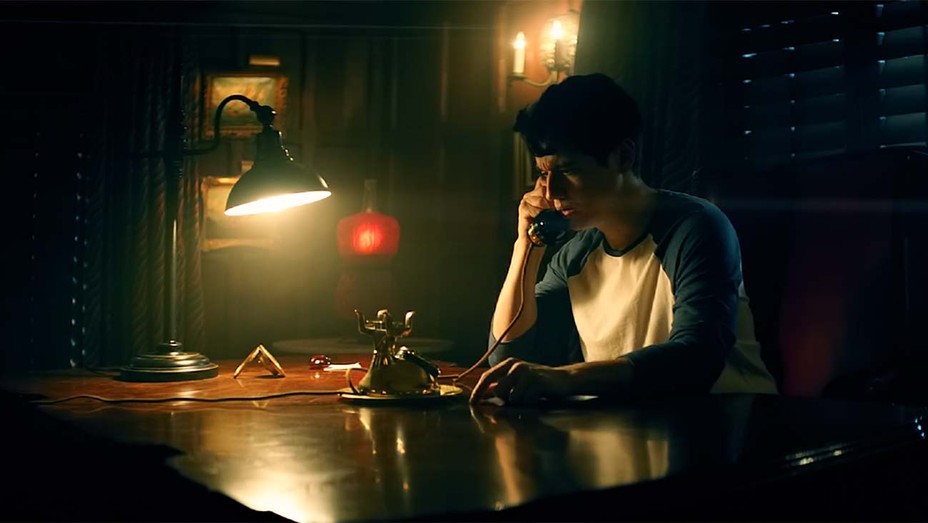What to Watch Verdict
'The Call' falls short in just about every conceivable aspect, wasting talents like Lin Shaye and Tobin Bell on a supremely unfrightful eyesore.
Pros
- +
🎠 One proper contortionist freakout.
Cons
- -
🎠 The horror lacks vision.
- -
🎠 The characters lack intrigue or depth.
- -
🎠 The performances would make cardboard seem like an upgrade.
- -
🎠 Everything, and I mean everything, is unpolished.
Timothy Woodward Jr.'s The Call is one you shouldn't answer. There's no need for a roundabout lede when not much about this sleeping pill in cinematic form inspires any reason for excitement. You've got Lin Shaye and Tobin Bell involved, so points awarded for recognizable horror casting, but even they fall prey to the film's disenchantment around every paranormal turn. The Call is so forcibly unnatural in its '80s time warp aesthetic, down to some laughably out-of-place 8-bit soundtrack and A Nightmare On Elm Street traces that are as crude as they are embarrassingly unsuccessful.
Chris (Chester Rushing) is the new kid in town, who becomes quick friends with misfit Tonya (Erin Sanders). They join brothers Zack (Mike Manning) and Brett (Sloane Morgan Siegel) playing carnival games before vandalizing the lavish home of Edith Cranston (Lin Shaye). Tonya claims Edith is responsible for her sister's death—Edith ran a daycare for local children—so it becomes a ritual to torment the aging, ailing woman. Tonya thinks nothing of the pranks except this time Edith hangs herself and leaves husband Edward (Tobin Bell) to play a game with the four delinquents outlined in her will.
If Chris, Tonya, Zack, and Brett can ring a phone in Edith's grave—and stay on the line for an entire minute—they all walk away with a $100K jackpot. Sounds like a cakewalk, eh? The Call upgrades the difficulty of such a challenge by injecting satanic magic into the posthumous conversation. Patrick Stibbs' screenplay poses the afterlife as an escape and implements a purgatorial, dream-like prison that becomes more than four snotty punks listening to dead air on a rotary phone's receiver. It's a concept that doesn't waste time on backstory or development yet undersells horror with such a disappointing luster that's duller than hospital paint jobs.
As each horrendously underwritten excuse for a character dials their doom, Edith's raspy voice welcomes listeners to a personal hell that transports onlookers to a red-and-orange lit warehouse where fears are used as weapons. These are the grounds where horror should reside, but cinematographer Pablo Diez wiggles and jostles the camera with such an ugly effect that—I presume—is a tactic to generate faux intensity? Certain scenes are an abysmal eyesore as the camera bounces nonsensically or holds on "horrors" that claim no benefit from extended exposure. Deceased sisters, abusive fathers, and dangling chains make it feel like you're running through a cut-rate Halloween maze of some knockoff Freddy Krueger boiler basement area, complete with Edith's vocality and dialogue carrying a familiar mimicry. Never even within spit shot of Wes Craven's talent, to confirm.
Performances and scripted blueprints fare no better, not like Woodward Jr.'s amateurish execution would flourish otherwise. The entire cast is lackadaisical and wooden throughout their line deliveries, without reason to point out further offenses. Fat chance the screenplay dutifully maps a narrative that acknowledges basic building blocks like introducing characters as siblings early enough for contextual relevance or supernatural conjurings that exist beyond the shrug of acceptance. Lin Shaye threatens and cackles her way as a ghost out for vengeance, but the Insidious icon's most terrifying outbursts are misdirected and are vastly more comedic—unintentionally—which at least provokes some audience reaction. The rest? Even Tobin Bell can't convince the camera his experience outmatches his younger cast members bashing arcade buttons at random or confronting demons that strut some serious 3AM late-night cable vibes.
The Call is an atrocious sequence of downbeats caught between haunted house mechanics and sinful punishment, unable to instigate even a flicker of frightfulness beyond flaccid jump scares or unwise camera tricks. It doesn't even appear finished at points, as edits come five painful seconds after the action completes on screen and an abandoned background remains curiously in-frame. There are no breakout superstars, impressive genre reinventions, or faithful veteran stalwarts doing what they do best. I understand and respect the blood, sweat, and passion that goes into filmmaking, but The Call is defined by its marathon string of baffling technical choices scene after scene. I don't think you're supposed to burst out laughing at the film's quintessential shock twists or root for characters to vanish as quickly as possible—I guess the real challenge is seeing if you can make it through The Call without pressing "Stop."
The latest updates, reviews and unmissable series to watch and more!
Matt Donato is a Rotten Tomatoes approved film critic who stays up too late typing words for What To Watch, IGN, Paste, Bloody Disgusting, Fangoria and countless other publications. He is a member of Critics Choice and co-hosts a weekly livestream with Perri Nemiroff called the Merri Hour. You probably shouldn't feed him after midnight, just to be safe.


